Sabem porque é que eu vos digo para usarem ferramentas AI em grande volume desde que não paguem nem um chavo às empresas de AI?
Porque a AI é uma bolha. Como qualquer bolha, quando rebentar vai ter efeitos na economia real. Mas quando mais depressa rebentar, menos efeitos terá. Se rebentar antes dos idiotas meterem AI em tudo será muito menos destrutiva do que rebentando depois.
Portanto, façamo-la rebentar depressa. Usem AI todos os dias. Não lhes deem um tostão furado.
was just chatting with a former student about how much interesting compiler work never gets written up, and of course other work is written up and then forgotten.
on that topic, was there ever a good overview or retrospective for Microsoft's Phoenix compiler? and does anyone have an educated guess as to how many engineer-years they put into it?
@brouhaha @monospace @goosey @alexr @foone
The R1000 is deeply interesting for more reasons than you can imagine, but what impresses most people is this:
Imagine you maintain a library in some corner of $ReallyBigAndImportantProject and one of your exported functions has a parameter which defaults to 3.
Now you want to change the default to 4.
Who do you call ?
On the R1000, you change the 3 to 4 and when you try to commit that change, it will tell you /precisely/ which other code modules would be /semantically/ affected by that change, and ask you what to do about that.
Only calls which do not explicitly specify that parameter will be on the list.
When we demo that for modern developers, some of them get upset that was possible in 1980 but they can't do it today.
idk what to say other than these dudes look exactly how I expected
Right! I now have a copy of Eloquence that works on the 64-bit alphas of #NVDA, with the following issues: say all on the web doesn't work (it stops whenever the type of element changes for reasons I don't understand), and dialect switching doesn't work (but it doesn't crash everything anymore). If you want to play, you need to follow the build instructions; I only understand about a quarter of this code and have no intention of actually releasing things that are still broken: github.com/fastfinge/eloquence_64/
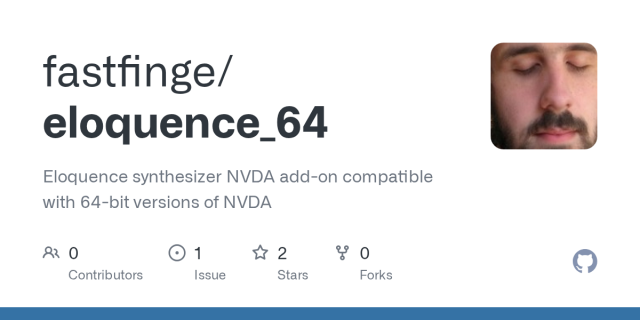
GitHub - fastfinge/eloquence_64: Eloquence synthesizer NVDA add-on compatible with 64-bit versions of NVDA
Eloquence synthesizer NVDA add-on compatible with 64-bit versions of NVDA - fastfinge/eloquence_64GitHub
I suppose I initially asked because of it defaulting to a Python helper process written in Python, using sockets as the IPC mechanism. Which is very AI, based on what will have been most common in the training data.
But for this sort of thing, I wonder about performance gains from shared memory, COM, or whatever with something other than Python on the other end.
> and AI can't help because we don't have the development headers for ECI.dll to feed it.
Ohhh I bet you could get it decompiled with something like IDA Pro and feed it to an AI model and get somewhere
🇨🇦Samuel Proulx🇨🇦 likes this.
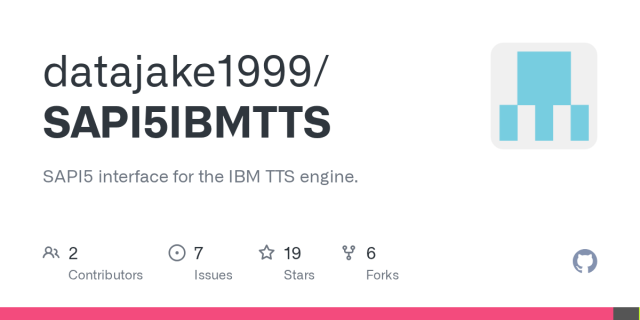
SAPI5IBMTTS/eci.h at master · datajake1999/SAPI5IBMTTS
SAPI5 interface for the IBM TTS engine. Contribute to datajake1999/SAPI5IBMTTS development by creating an account on GitHub.GitHub
🇨🇦Samuel Proulx🇨🇦 likes this.
I probably know even less about IPC and threads, but there's plenty of learning scope in that department.
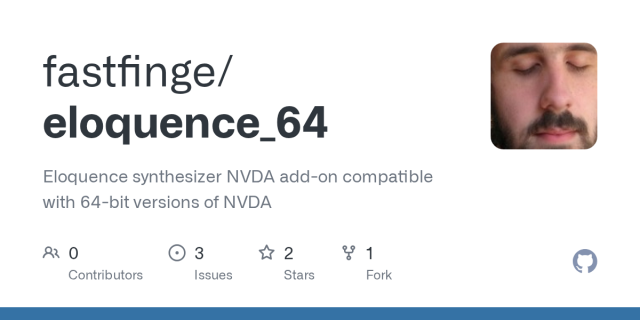
eloquence_64/host_eloquence32.py at master · fastfinge/eloquence_64
Eloquence synthesizer NVDA add-on compatible with 64-bit versions of NVDA - fastfinge/eloquence_64GitHub
Ma mère, vivant à Paris, accueille un réfugié tibétain chez elle. Ça arrange bien tout le monde, mais ce qui l'arrangerait encore plus lui, c'est de trouver un boulot à Paris ou en banlieue, en journée. Il comprend bien le français mais le parle encore difficilement. En revanche anglais fluent. Il aimerait bien trouver dans la restauration mais pour l'instant tout travail serait le bienvenu. Si jamais tu as ça...et sinon repouet apprécié.
Of course you have to make sure that the website is also one that belongs to the person in question, and they have to have linked it. For example, if the URL says something like iamtalon.fakewebsite.com then that's probably not me.
It's not a bullet proof system, but it is definitely a tool available to check.
Some clients might also display this. Enafore displays it, it says "Verified" under the website link in the profile fields. I'm not sure about other clients, though the website of the instance will show it as well as quoted above.
@jscholes The UK and US are the only two countries with "ID allergy."
In the rest of Europe (and the rest of the world)., it is obvious that every citizen has an ID card, (which is distinct from any other document which could potentially be used for identification, like a passport or driver's license).
Even Germany, which is famously stubborn about things like these (they don't have a single citizen identification number for example) has ID cards.
@FreakyFwoof @jscholes Not having an ID doesn't mean your data is safer, in fact, it's just the opposite.
Without an ID, it's much harder to prove who you are, so organizations that need to do so have to collect more data about you.
New, by me: If you're not using ad blockers, you should be! I wrote 2,000+ words on why you should use them and how to get started.
In this deep-dive blog, I explain why ad blockers are critical for your online security and privacy, what threats ad blockers can help defend against, and we'll look at some of the best ad blockers out there.
More: this.weekinsecurity.com/why-ad…
You can also sign up for my weekly cybersecurity newsletter, out Sundays: this.weekinsecurity.com/

Why ad blockers are a top security and privacy defense for everyone
Ad blockers can help defend against some of the top hacks, scams, and surveillance today. Here are some of the best ad blockers that you can use.Zack Whittaker (~this week in security~)
One advantage of using #AdGuardHome is that it provides statistics on the responsiveness of public DNS providers.
For me, #DNS4EU is by far the fastest (10 ms). Perhaps it's because of their geographical proximity, as they're also based in Czechia. The slowest has been #quad9 at 500 ms. I have no idea why.
I'm also glad to learn that DoH doesn't have a significant speed penalty. It's 12 ms versus 10 ms for DNS4EU. So you don't have to trade privacy for responsiveness.
What has been your experience with #DNS providers based in Europe? Do you have any recommendations? I'm interested in unfiltered DNS because I do the filtering in AdGuard Home.
You can measure this average response time without this feature. AGH only uses the response time for the DNS records that are not in its cache or expired ones if optimistic cache isn’t enabled.
I24: Qatari media reports that Hamas to hand over additional bodies of deceased Israeli hostages tonight.
(Me: We will see if “additional” is all 24, I guess.)
My company has recently stopped using GitLab and I think it's worth a quick discussion why, because I think these are largely addressible.
Firstly, their paid product for teams is very pricey. Where Github costs ~$4 per seat per month, GitLab charges $29 per month. Even if we assume some portion of that is due to Microsoft's economy of scale and exploitation of user code for things like AI training, that's 7.5x more expensive!
GitLab charges for things like API address, and even more (full price) if you want to do things like store secrets via API.
While the direct cost wasn't a lot, I didn't feel like being nickle and dimed, and the product was just not worth it.
I enjoyed the product, but the pricing wasn't 2x, or even 3x, but >7.x! I felt like I was being taken advantage of, so we left altogether!
That's something I never considered.
Glide is the world’s first autonomous and intelligent guide for people who are #blind or have low vision.
To find out more or pre-order your Glide today, saving a total of 25%, be sure to use my referral code at check-out!
PIONEEROYHRP
glidance.io/preorder/
DISCLAIMER:
I do not work for Glide, but I have pre-ordered one. Up to three people can use this referral code, which gets me a discount on the Glide software subscription for my own unit.

Preorder Your Glide Today - AI Guide for Blind and Low Vision
The world's first Intelligent Guide, helping people who are blind or have sight loss navigate safely and independently. Preorder now!Glidance
🥁 Trommelwirbel… Wir starten jetzt unser Crowdfunding für den WEtell Hub!
📧 Mail. ☁️ Cloud. 📅 Kalender. 👥 Online Office. Ein Zuhause für deine Daten.
Keine Werbung! Keine Datenkraken! Keine Kompromisse!
Mach jetzt mit und sei Teil der Bewegung für eine digitale Zukunft mit Haltung. 💚
Mach jetzt mit auf 👉 startnext.com/wetell-hub
WEtell Hub – Digitale Infrastruktur mit Haltung
Sag Nein zu US-big-tech! Bau mit uns eine digitale Infrastruktur, die unabhängig, klimafokussiert und fair ist.startnext.com
OK Linux folks. With #KDE hitting 29 years old, I'm curious about switching my gaming PC from Windows 11 to KDE. The games I play are listed on ProtonDB as being gold or platinum, so I think I'm good as far as gaming goes, but I have some other software concerns.
What do y'all use for cloud file storage/syncing?
What do you use for image editing/creation?
Where can I find out if my Razer Leviathan and HyperX mic will work on KDE?
Nextcloud isn't just a storage any more. It's a platform for integrated apps. I cover a lot of things with it: files, calendars, contacts, tasks, document editing, photo albums, password manager, RSS reader, notes taking... If you don't prefer selfhosting, Hetzner provides it for ~€5/TB/month.
GIMP has improved, but its UI isn't radically different from what it was 20 years ago. There are other editors. Just "I need exactly Photoshop and Light room" doesn't work.
@tk here have some cheese
foodandwine.com/microplastics-…

Scientists Confirm Widespread Microplastics in Milk and Cheese
Microplastics have now made their way into one of the most unexpected places: dairy. Scientists in Italy found plastic fragments in milk, fresh cheese, and aged cheese — which they believe are introduced during production and processing.Stacey Leasca (Food & Wine)
- Batman arrested for driving the Batmobile uninsured (0 votes)
- Batman arrested for committing insurance fraud (0 votes)
Seirdy reshared this.
Linux? Well the number of services you run are on you, really. If you want 1 GB of Ram, install Mate and it's good. Monday rant over!
I hung up and redialled so I could capture it in all its synthetic glory.

AT&T Audrey natural voice
Listen to AT&T Audrey natural voice by typongtv #np on #SoundCloudSoundCloud
Say hello to @RocketChat a proud sponsor of Matrix Conference 2025 in Strasbourg!
🍴 Swing by their booth right by the food bar for a chat,
🥂 join them co-hosting the welcome party on Wednesday, or
🎤 catch CEO Gabriel Engel on stage sharing his insights.
Thanks Rocket.Chat for sponsoring The Matrix Conference!

Rocket.Chat | Secure CommsOS™ for Mission-Critical Operations
Centralize real-time messaging, voice, video, AI, and apps for secure, reliable and unified communication among internal and external stakeholders.Rocket.Chat
Around 200,000 Linux computer systems from American computer maker Framework were shipped with signed UEFI shell components that could be exploited to bypass Secure Boot protections.
Languages are fun, have mysterious rules called grammar, but their native speakers certainly don't care about all that. In other words, do native speakers of a language speak the language correctly, as textbooks prescribe? (Hint: Definitely not.)
Here's a video to illustrate this. Thanks, Google recommendations. youtube.com/watch?v=nIl_rdTUU1…

16 phrases you can hear native British English speakers say that you were taught were wrong
In this English Lesson with British English Teacher Roy, learn how to sound more like a native British English speaker when you speak English. In this Englis...YouTube
Winter blue tardis reshared this.


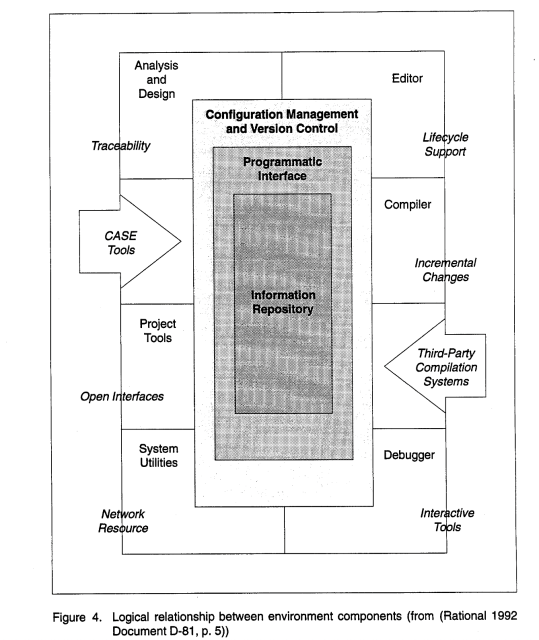













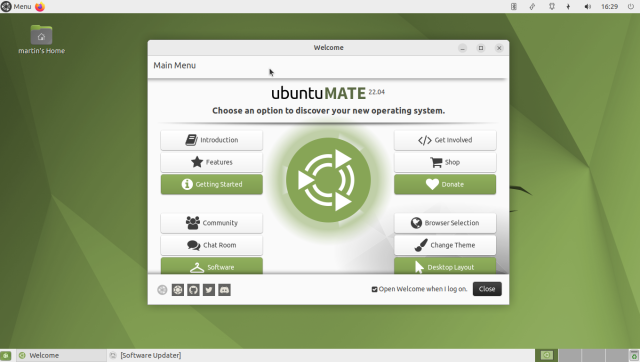



Peter Saathoff-Harshfield
in reply to victor tsaran • • •